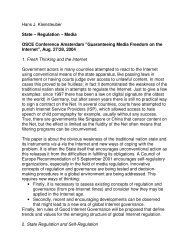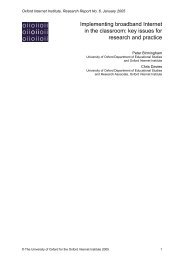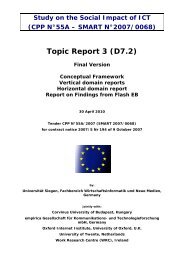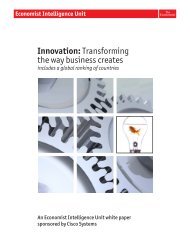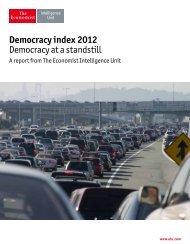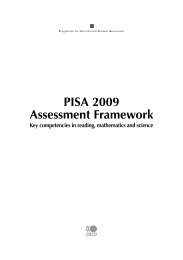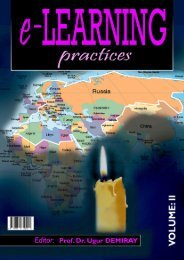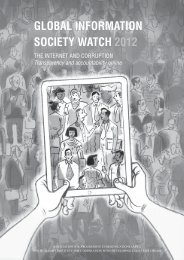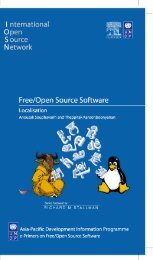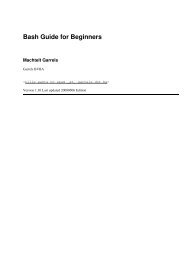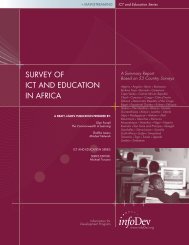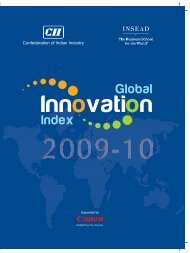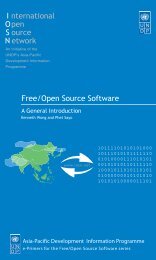Legal Aspects of the Information Society. - Free Technology Academy
Legal Aspects of the Information Society. - Free Technology Academy
Legal Aspects of the Information Society. - Free Technology Academy
Create successful ePaper yourself
Turn your PDF publications into a flip-book with our unique Google optimized e-Paper software.
GNUFDL • 19 Intellectual property: authors' rights and copyright<br />
3.2. Ownership <strong>of</strong> rights in a derivative work<br />
As we have already studied, an original work is a work <strong>of</strong> autonomous and<br />
independent creation, even if published collectively with o<strong>the</strong>rs. A derivative<br />
work, on <strong>the</strong> o<strong>the</strong>r hand, is a new work resulting from <strong>the</strong> transformation<br />
<strong>of</strong> pre-existing work, usually without <strong>the</strong> collaboration <strong>of</strong> <strong>the</strong> author <strong>of</strong> <strong>the</strong><br />
latter, but with his/her permission (see below).<br />
As <strong>the</strong> derivative work constitutes a new work, even if it is based on ano<strong>the</strong>r,<br />
<strong>the</strong>re are <strong>the</strong>refore two different works and two sets <strong>of</strong> rights: in <strong>the</strong> original<br />
work and <strong>the</strong> derivative work. We will see below that <strong>the</strong> author <strong>of</strong> <strong>the</strong><br />
derivative work needs <strong>the</strong> permission <strong>of</strong> <strong>the</strong> original author or rightsholder in<br />
order to create this new work, and must exploit <strong>the</strong> new derivative work in<br />
accordance with <strong>the</strong> licence granted by <strong>the</strong> original rightsholder.<br />
We will also see below that copyleft (in <strong>the</strong> GPL or o<strong>the</strong>r copyleft license) is a<br />
free s<strong>of</strong>tware licensing mechanism enabling o<strong>the</strong>rs to create works based on<br />
existing s<strong>of</strong>tware, but forcing <strong>the</strong> new author, if he/she redistributes <strong>the</strong> new<br />
work, to do so under <strong>the</strong> terms <strong>of</strong> <strong>the</strong> same copyleft free s<strong>of</strong>tware licence – i.e.<br />
maintaining <strong>the</strong> freedom <strong>of</strong> <strong>the</strong> work.<br />
3.3. Identifying <strong>the</strong> author and/or rightsholder<br />
As <strong>the</strong> original authors or rightsholders to a work are those that can first exploit<br />
or authorise <strong>the</strong> exploitation <strong>of</strong> a work, and may also assign <strong>the</strong> rights<br />
<strong>the</strong>reupon (by licence) to a new rightsholder, it is clearly important to know<br />
<strong>the</strong> methods <strong>of</strong> identifying <strong>the</strong> copyright holders.<br />
The © symbol, intellectual property registration and authorship recognition<br />
notices in <strong>the</strong> work itself are <strong>the</strong> most common instruments for identifying<br />
<strong>the</strong> owner <strong>of</strong> <strong>the</strong> Authors' rights to any work, although such formalities have<br />
not been mandatory since <strong>the</strong> Berne Convention.<br />
Generally speaking, copyright law provides that:<br />
• The author shall be presumed to be whoever appears as such in <strong>the</strong> work<br />
by name, signature or mark identifying <strong>the</strong>m (notice <strong>of</strong> authorship: © Jane<br />
Smith, 2007).<br />
• If <strong>the</strong> work has been disseminated anonymously or under a pen name,<br />
<strong>the</strong> exercise <strong>of</strong> <strong>the</strong> rights shall correspond to <strong>the</strong> person disseminating <strong>the</strong><br />
work with <strong>the</strong> consent <strong>of</strong> <strong>the</strong> author.



